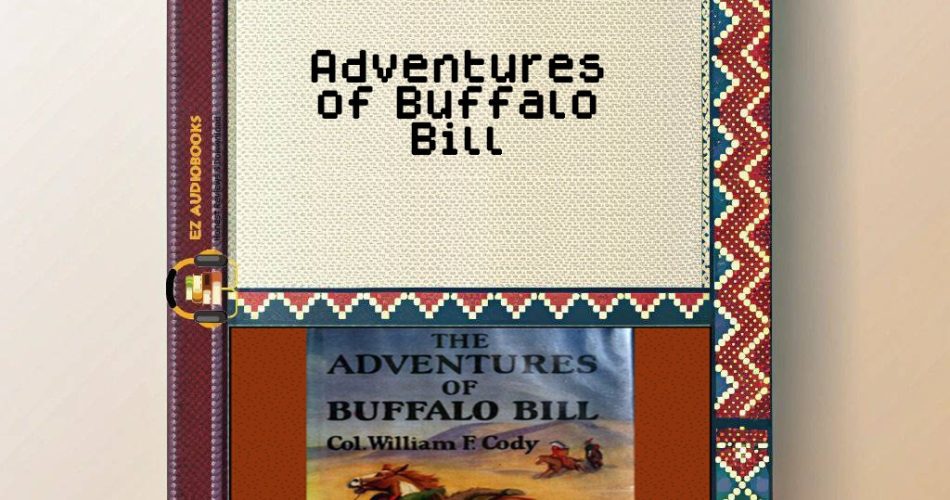Audiobook Sample
Listen to the sample to experience the story.
Please wait while we verify your browser...
- Title: Adventures of Buffalo Bill
- Author: William Frederick Cody
- Narrator: Various Readers
- Length: 03:34:00
- Version: Abridged
- Release Date: 01/01/2011
- Publisher: LibriVox
- Genre: Biography & Memoir, Memoir
- ISBN13: SABLIBX978652
The moment the first narrator’s voice crackled through my headphones, I was transported to a campfire on the Wyoming plains, much like those I’d gathered around during my research trips through the American West. There’s something profoundly intimate about hearing Buffalo Bill’s adventures told through the collaborative voices of LibriVox’s volunteer narrators – it feels less like a polished performance and more like a group of old-timers passing down oral history, each adding their own texture to the legend.
William Frederick Cody’s “Adventures of Buffalo Bill” straddles that fascinating line between memoir and mythology that I’ve encountered so often in my travels. Listening to his account of killing 4,280 buffalo in 18 months (the numbers spoken with such matter-of-factness), I found myself back in Chile’s Atacama, where local gauchos would tell similarly grandiose hunting stories with the same unshakable conviction. The audiobook’s multiple narrators somehow enhance this effect – when the perspective shifts from Cody’s scouting days to his Wild West Show exploits, the change in voice subconsciously signals we’re moving between different chapters of the myth.
What struck me most was the sensory richness that emerges through audio. When describing his Pony Express days, you can almost hear the pounding hooves and feel the dust in your throat. The various narrators handle these passages differently – some with breathless excitement, others with laconic understatement – creating a fascinating polyphony that mirrors how frontier stories must have varied from teller to teller in saloons and trading posts. It reminds me of those Oaxacan storytelling nights, where the same folktale would transform completely depending on who was telling it.
The book’s historical complexities come alive differently in audio format. Hearing Cody’s descriptions of Native Americans (sometimes respectful, sometimes uncomfortably stereotypical) made me more aware of the tension between his progressive-for-the-time views mentioned in the foreword and the era’s prevailing attitudes. There’s a particularly poignant moment when one narrator delivers Cody’s account of Indian campaigns with such gravitas that you can’t help but reflect on how these stories shaped – and sometimes distorted – our understanding of the West.
As someone who’s spent years documenting oral histories, I appreciated how the audiobook format highlights Cody’s showman instincts. The dramatic pauses before gunfights, the folksy asides about frontier life – these are techniques I recognize from master storytellers across cultures. The rotating narrators actually serve the material well here, as different sections benefit from different storytelling approaches: the early adventures demand wide-eyed enthusiasm, while the autobiographical reflections require more measured delivery.
Yet this audiobook also confronts us with uncomfortable truths about how legends are made. Listening to Buffalo Bill describe his buffalo hunting exploits, I couldn’t help but think about how these stories, thrilling as they are, represent a worldview that saw wilderness as something to be conquered. The multiple narrators subtly underscore this – some voices sound celebratory, others more elegiac, creating space for the modern listener to engage critically with the text.
For fellow travelers through history’s landscapes, I’d recommend this audiobook particularly for road trips through the West. Play it while driving through Cody, Wyoming (the town Bill founded), and you’ll feel history’s layers unfolding around you. The free LibriVox production has that wonderful public-domain charm – occasional background noises, the slight unevenness of volunteer recordings – that makes it feel like discovering a box of old frontier recordings in a historical society basement.
What emerges most powerfully is the portrait of a man who became the avatar of his era’s contradictions: a buffalo hunter who respected Native cultures, a truth-teller who embellished his tales, a progressive who profited from romanticizing the past. The rotating narrators become different facets of this complex figure, giving us not a monolithic Buffalo Bill but a kaleidoscope of frontier memories.
Yours in the shared journey of stories,
Marcus Rivera

